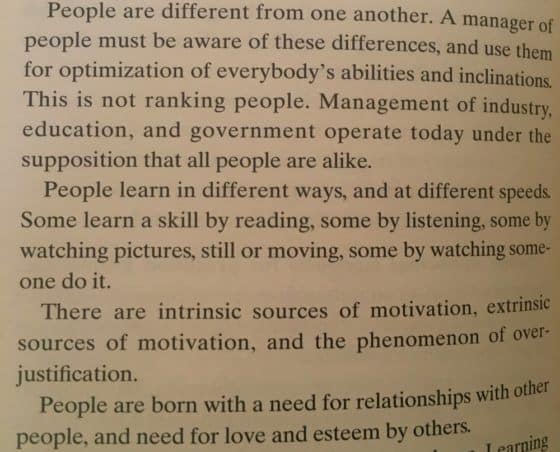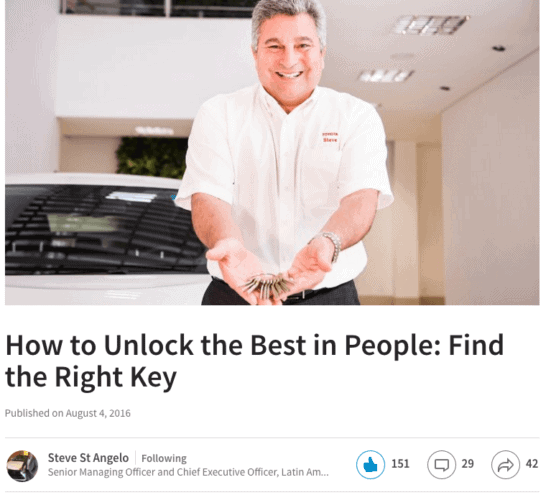I'm always happy to hear current-day Toyota leaders (like Jamie Bonini) or recent Toyota leaders (like Gary Convis) share perspectives on leadership.
It's not that Toyota's perfect, but we're hearing about Lean concepts “straight from the source,” in a way.
Here's a recent LinkedIn article by Toyota's Steve St Angelo. He was, at one point, the President of the famed Georgetown (TMMK) plant and he's now Senior Managing Officer and Chief Executive Officer for the Latin America and Caribbean Region.
He writes, in part:
“I believe there is a key for every person. It unlocks their way of thinking, their viewpoint, their motivation. It opens up their spirit or soul.
Every single person has a specific lock, so to speak. As leaders, we need to find the right key.“
People are individuals. We're unique. Employees are not just “cogs in the machine,” and that's the case at a manufacturer like Toyota.
Leaders can't expect that every tactic or attempt to motivate people is going to resonate the same way with each individual.
“But, it takes time to get to know my employees as individuals,” somebody might complain. Yeah, but it's worth it, if not necessary for success.
Toyota was, of course, influenced greatly by the late W. Edwards Deming. When I read St Angelo's piece, it reminded me of what Dr. Deming wrote in the book The New Economics.
Part of Deming's “System of Profound Knowledge” was psychology. While Deming is often sold short by being labeled as a “statistician,” I think he understood people brilliantly and he said that psychology is the most important thing for a leader to understand.
From the Deming Institute website:
“Dr. Deming understood the fundamental truth that people are different. Management must be aware of the differences and use them for optimization of everybody's abilities and inclinations. He also understood that people are primarily motivated by intrinsic needs, including taking pride in workmanship and working with others to achieve common goals, in contrast to simply being motivated by monetary reward, which he viewed as a shortsighted external form of motivation.”
And from the book, Deming said directly:

I also agree strongly with St. Angelo when he says:
“I don't believe a person gets up in the morning planning to do bad work, cause problems or waste time. I believe, with all my heart, there are no bad employees. There are leaders who do not know how to uncover the best in that person.”
I have met many hospital managers and executives who apparently DO think some people intend to do bad work, cause problems, or waste time. I've heard leaders complain about employees being careless, stupid, or lazy. That's not leadership.
These leaders aren't self reflective enough to ask why they don't know how to uncover the best in that person… are why they aren't motivating that employee. Dr. Deming would probably correct me and say, “The leaders don't ask why they are demotivating the person” (read more).
Mindsets and philosophies like those expressed by St Angelo are harder to copy than Lean tools. Is that why so many organizations have struggling or stalled-out Lean initiatives? It's because they're not being Lean leaders… although those “leaders” would probably want to blame their staff for “not buying in” to Lean or not being creative enough.
What do you think?
What do you think? Please scroll down (or click) to post a comment. Or please share the post with your thoughts on LinkedIn – and follow me or connect with me there.
Did you like this post? Make sure you don't miss a post or podcast — Subscribe to get notified about posts via email daily or weekly.
Check out my latest book, The Mistakes That Make Us: Cultivating a Culture of Learning and Innovation:










Comment via LinkedIn:
Theo Liskamp: If managers and executives think their employees are doing a bad job on purpose, they should ask themselves one simple question: why? When you are a coach of a team your job is to make them better individually and as a team. And every individual is different, so there is no ‘out of the box model’ for motivation. You don’t need to be a psychologist though, but being interested in what drives everybody in your team is the least you can do. After that you could use these insights to help them develop themselves, and the team.
Deming also said the role of a manager is to help people get better instead of just judging them. You don’t have to be a psychologist, but learning more about psychology certainly helps.
Great post. Leaders’ job is to remove obstacles to success and understand WHY their employees engage in behaviors that may not be in the best interest of the organization (or themselves). This is one of my favorite photos to show in Lean training…we talk at length about WHY:
Thanks, Mark, for shining a spotlight on these two enlightened and inspiring individuals. Thanks to advancements in neuroscience, we know each person’s brain is unique. So there’s scientific evidence about the value of treating each employee as an individual rather than lumping everyone together.
It does take time to get to know the people you work with. For example, are they approach oriented, as are most executives, or avoidance? Are they more concerned about the why or the how? Do they like public recognition or prefer to be thanked in private? Individuals can show strong preferences and can get quite agitated if they have to go ágainst their natural flow. Leaders can help themselves, their employees and the organization by knowing their people and working with them, not against, them.
Thanks, Liz. Every employee is unique and that includes executives :-)
Yes, Mark. Executives are individuals too, and believe me, I’ve beaten myself up a few times after realizing I could be threatening leaders’ status with my enthusiasm for getting employees involved. For more about this, see this blog post: http://connectconsultinggroup.com/sorry-for-threatening-leaders-status/
You’re not alone… it took me a long time to grasp how Lean could be threatening to senior executives. Logic alone doesn’t win the battle that Lean is a very effective strategy…
We all do things that aren’t in our own self interest, I guess, whether that means staying up too late, eating too much (or the wrong things), etc.
Executives too…